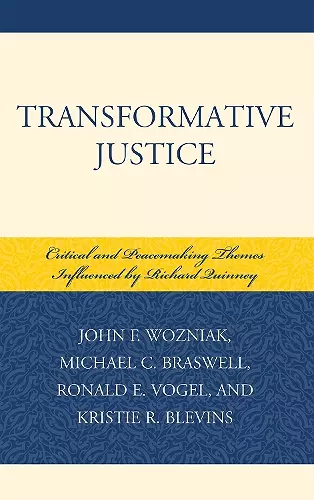Transformative Justice
Critical and Peacemaking Themes Influenced by Richard Quinney
John F Wozniak editor Michael C Braswell editor Ronald E Vogel editor Kristie R Blevins editor
Format:Hardback
Publisher:Lexington Books
Published:16th Dec '08
Currently unavailable, and unfortunately no date known when it will be back

The criminological contributions of Richard Quinney have spanned four decades and have spawned and energized both critical and peacemaking intellectual and activist movements in the field of Criminology. Quinney has been consistently recognized as one of a small handful of seminal thinkers in the discipline. The introduction illustrates how each chapter: has drawn inspiration from the crime-related writings of this influential criminologist; contains core assumptions of critical and peacemaking criminology; has application for the development of transformative justice as an alternative approach to the study of crime. Part 1 features chapters generally falling within the parameters of critical criminology. Here, critical analyses are directed toward: linkages of capitalism and political economy to crime; state/corporate crime; feminist concerns about moral conscience; views of crime and justice among convict criminologists; prison as an industrial complex. Part 2 exhibits chapters oriented toward the development of peacemaking criminology. As such, peacemaking criminology is explored in regard to: an emergent theoretical model; a synthesis of Quinney's peacemaking-oriented writings; women's crime and mothers in prisons; teaching and learning about justice through a non-violent perspective; advocating justice reforms on the internet; its future directions in terms of theory and application.
Surely few contemporary criminologists have influenced so many others in such profound ways as Richard Quinney. He took a professional and personal path wholly unlike that of any other criminologist, and produced a rich, highly original and often lyricalbody of work. This superb book of essays introduces a new generation of criminology students to the unique and provocative thought of Richard Quinney and demonstrates how he helped shape peacemaking criminology. In an era when over two million Americans are incarcerated, and new repressive and retributive dimensions of criminal justice continue to be introduced, inspiring alternative ways of thinking about crime and justice are needed more than ever. It is difficult to imagine anyone reading this book and not being personally transformed by the experience.. -- David O. Friedrichs, Distinguished University Fellow and Professor of Sociology/Criminal Justice, University of Scranton (Pennsylvania)
Building on the rich legacy of Richard Quinney, Transformative Justice challenges traditional criminological thinking and, in so doing, illuminates fresh, humane approaches for alleviating crime and suffering. Critical yet uplifting, utopian yet practical, and sophisticated yet accessible, this volume is both an indispensable addition to any scholar's library and ideal for classroom use. -- Francis T. Cullen, Distinguished Research Professor Emeritus, University of Cincinnati
This splendid collection of readings—inspired by Richard Quinney's transformative ideas on crime and criminal justice—is a first-rate testament addressing the one abiding concern about the human spirit that Richard has consistently urged us to personally and collectively confront: How might we live? -- A. Javier Treviño, Wheaton College
Surely few contemporary criminologists have influenced so many others in such profound ways as Richard Quinney. He took a professional and personal path wholly unlike that of any other criminologist, and produced a rich, highly original and often lyrical body of work. This superb book of essays introduces a new generation of criminology students to the unique and provocative thought of Richard Quinney and demonstrates how he helped shape peacemaking criminology. In an era when over two million Americans are incarcerated, and new repressive and retributive dimensions of criminal justice continue to be introduced, inspiring alternative ways of thinking about crime and justice are needed more than ever. It is difficult to imagine anyone reading this book and not being personally transformed by the experience. -- David O. Friedrichs, Distinguished University Fellow and Professor of Sociology/Criminal Justice, University of Scranton (Pennsylvania)
ISBN: 9780739109328
Dimensions: 241mm x 160mm x 25mm
Weight: 526g
266 pages